Fat – A Misunderstood Ingredient
Posted by Alexa Clark on Friday, February 20th, 2009Tags for this Article: Coupe Space, fat, foie-gras, ingredient, Jennifer McLagan, tasting club
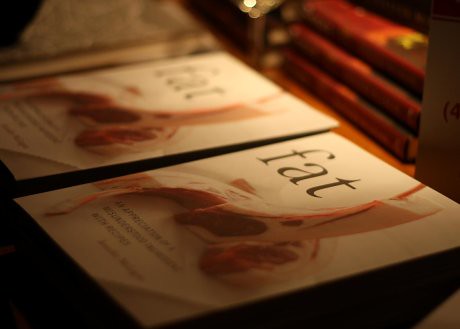
Fat, it’s a misunderstood and much-maligned part of a cook’s arsenal. Without it pastry would be paste, roasted potatoes might as well be boiled, even chicken soup wouldn’t have its famed magical properties. And croissant? Well, croissant simply wouldn’t be. It’s not possible to create those flaky, tender, miracles of goodness without butter and butter is fat. And fat is good.
I was lucky enough to snag a couple of tickets to a Fat Tasting lead by Jennifer McLagan, author of Bones and the newly released Fat: An Appreciation of a Misunderstood Ingredient, with Recipes in which she discusses the benefits of culinary fats, dispels some of the myths and includes some tasty treats. The tasting was the first of the 2009 Tasting Club events at Coupe Space.
Accompanied by Stephen Alexander (Cumbrae’s), and Martin Malivoire (Malivoire Wine Company), Jennifer led us though a tasting of fats using Cumbrae’s naturally-raised meats, Jennifer’s recipes from Foie Gras Butter to Crackling Brittle all accompanied by a selection of Martin Malivoire’s certified-organic wines (Malivoire Wine Company).
The first plate was a selection of butters, fat and charcuterie. This was the most interesting plate of the evening as we tasted fat, on its own in multiple forms as if it were cheese. The plate included a farmhouse butter from Forfar Dairy in the Ottawa Valley; an Échiré butter from the Loire Valley in France; a pork fat infused with rosemary and a Foie Gras Butter. The butters were fragrant and delicate, vastly different than the foil-wrapped blocks which are readily available. 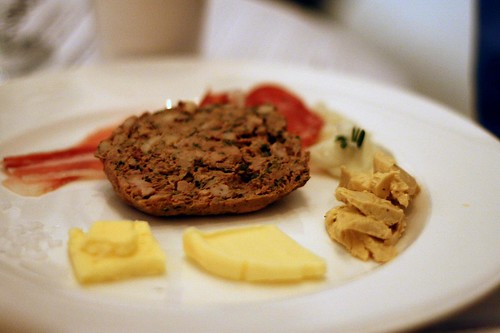
The second plate of the evening had a slow-roasted pork belly with rosemary and braised fennel, alongside a brisket braised in red wine.
Finally a dessert plate with a tender suet scone and a brittle with pork crackling. I’m not a huge fan of brittle but it did carry that salty sweetness to a new level. The suet biscuit was more a scone than a traditional biscuit, tender and sweet, served with apricot preserve and pear. [Crackling Brittle Recipe]
Of all the flavours and textures of the evening, the Foie Gras Butter was, by far, the most delightful and surprising thing I tasted. Complex, flavourful but not overpowering. It seems perfectly reasonable but I’d never thought of using foie ends to whip up this amazingly rich and flavourful spread. [Foie Gras Butter Recipe].
If this tasting was any indication of what is inside the book, I’m looking forward to spending some long hours reading, rendering and reproducing the recipes Jennifer has created in Fat.

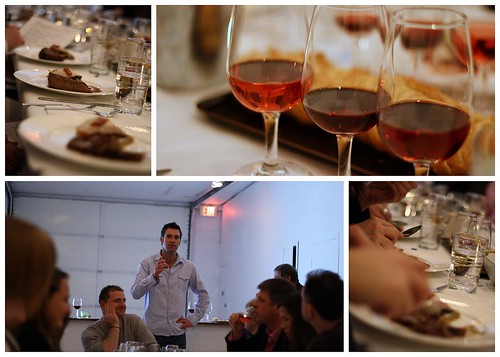
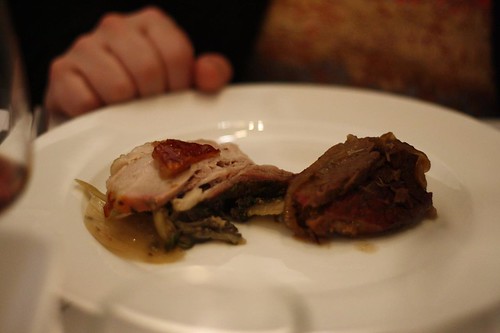
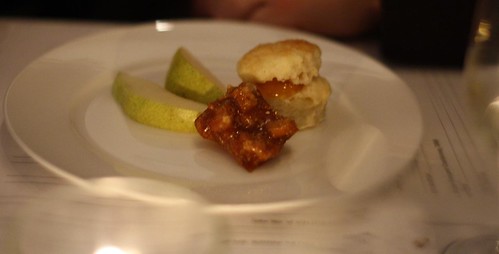
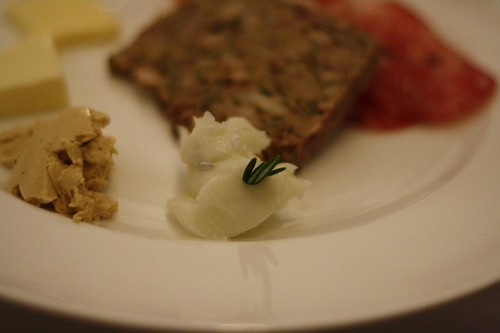

Posted on February 20th, 2009
Glenn says:
Why do we always leave out the backstory of our fat? Animals are raised in horrible conditions, killed when they are barely adolescents, just for our enjoyment? No one needs to eat this stuff, which means that all of that suffering and death is totally and completely unnecessary.
Ducks used for foie gras (which you describe as “amazing”) are confined in individual cages and force-fed a massive amount of food each day until their livers are 10 times the normal size. Many of the ducks can’t even walk after the force-feeding period.
It’s sad that we ignore all of the pain and suffering just to pleasure ourselves. It’s pure gluttony.
Posted on February 23rd, 2009
James says:
Hi Glenn: your point about the backstory of fat is, I think, an important one. How we raise our food and harvest it is as much a part of the preparation as the cooking.
That said, I think your opinion is one-sided and a generalization that serves no one and only inflames discussion.
*Many* animals are raised in horrible conditions: true. But I think if you go a little deeper into the Foodists site you’ll discover a very holistic approach to food that considers how we source all our food.
And I think you’ll find that in mostly all contexts we seek to source humanely-raised, happy food from sustainable farmers.
Please make your choices as you see fit and let other make their choices. Your values and judgements are not everyone’s values and judgements.
Posted on February 24th, 2009
Alexa Clark says:
Hi Glenn & James, Thanks for your comments.
Glenn, I agree with much of what you have to say. As a meat-eater who was raised on a working farm, I believe strongly in the ethical & humane treatment of animals. It is also important to me that if I am choosing to eat meat, that there is little waste and as much of the animal is used as possible including the fat.
To that point, the Foie Gras Butter was an “amazingly rich and flavourful spread”. And if someone has already made the decision to purchase foie gras, this is a way to ensure that there is little-to-no waste involved.
While I didn’t mention it in the post, since I was focused on the tastes specifically, this particular series of events does have a heavy emphasis on highlighting local farmers, purveyors and suppliers who are building a more ethical and sustainable food culture in Ontario.
As I mentioned at the top of the post, fat is controversial. Meat is controversial. If you have made the choice to eat meat, I think it is your responsibility to consider the way the animals you are eating are raised, tended and slaughtered. I think it is your responsibility to ensure that everything that can be used from that animal is. Including the fat.
Posted on February 24th, 2009
Linda Carson says:
Foie gras is controversial & highly emotionally charged. I could wish your commenter, Glenn, had been more persuasive & less sweeping. Emotional condemnation of meat-eating stamps his readers as gluttonous sinners. You can’t win someone over to your position if you’ve condemned them outright.
This is an opportunity to highlight the dilemma around foie gras & specific responses that advocates propose (from boycotts & restricted sale to reforms in how the animals are reared & moderation of consumption, off the top of my head). It’s an opportunity for a discussion of how slow food & local food movements propose alternative models for moderate, respectful, resourceful consumption. What better use of the social networking platform than to spark dialogue with a current & nuanced view of issues? Food for thought.
I sat across the table from Alexa at that tasting and also thought the foie gras butter was the highlight of the evening. I’ve never had a chance to eat foie gras before, so I’ve conveniently avoided querying my conscience on its production and consumption.
What stood out for me at this tasting is the recurring theme of moderate use of quality ingredients of known provenance. A middle-ground route to healthier eating, smaller footprint, and ethical treatment of animals is to set high standards and know your producers. That’s a conversation worth having, often, because that middle ground is much harder to find and live up to every day than the absolutist positions at either end. The moderate middle needs information and support and a clear understanding of what each of the issues is (veal pens vs carbon footprint vs waste ponds vs antibiotics) so we can learn to eat, day by day, in ways that are consistent with our values and our circumstances.
Posted on February 25th, 2009
Alexa Clark says:
Linda, thanks for your well-considered comment.
As James points out above the Foodists site and contributors do, in general, have “a very holistic approach to food that considers how we source all our food”.
In fact, there’s even a recent post on a Spanish producer of humane foie gras.
Posted on May 8th, 2009
Neil Petrunia says:
Interesting. Glen has accomplished the goal of every good troll. Pop into a discussion that he’s offended by, drop a bomb, then watch as everyone scurries around discussing his (irrelevant to the original discussion) post.
Glen had to deliberately click on the link to the article. He’s a vegetarian, apparently. So why the interest in a subject that is out of bounds for him? I say, enough.
Alexa, your article was interesting, and I may now go and buy that book. And when I cook some recipes, I will be sure that if they use wheat, it will be humanely ground.
Posted on December 13th, 2009
Christopher says:
Julia Childs is credited with asking “do vegitarians ever look forward to dinner?” I think for the most part vegetarianism for ethical reasons is an incredibly naive attitude and I won’t say more.
I’ve been a customer of Cumbreas for more than 15 years and buy 90% of my meat there. It’s simply a matter of quality. And a large part of that quality includes local, natural and humane. I don’t believe that quality meat can be raised any other way. I try not to buy any factory farmed meat, and I don’t buy veal or fois gras. The veal is easy, I don’t think it is a particularly interesting ingredient, but I do wish I could eat the fois gras every once in a while.
I won’t be too hard on Glenn, his heart is in the right place, and we need the fringe to define the middle.
Now on to the real issue, FAT. Yippee! I’m loving the fact that we are finally beginning to embrace fat as an integral part of good cooking and a healthy lifestyle. I took the Fat book out of the “Cumbrea Library” and read a bit of it, I think the author is right on the money, and I will likely buy a copy for myself sometime soon.
For a long time now, I’ve cooked with the right fat for the job in the correct quantity and then moderated my intake and stayed active. And while I have had to work to keep it that way, I am not overweight.
Fat was vilified in the 80’s in order to sell low fat products, diet books et al. And the masses, as usual, believed what they were told. Before that it was sugar (still is) and then carbs and on and on. If we excluded everything the media tells us makes us fat all at once we’d literally starve to death.
Books like “Fat” and events like the above are great in my opinion, an I would have loved to have attended.